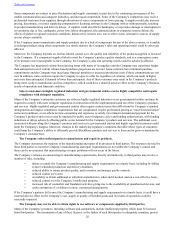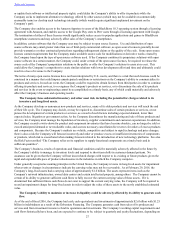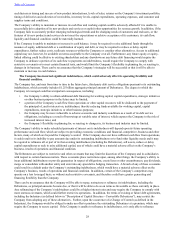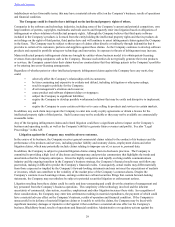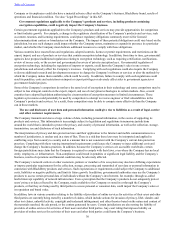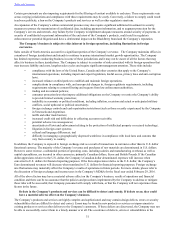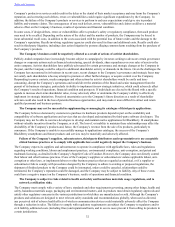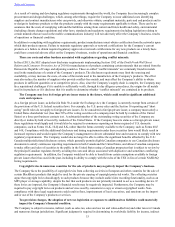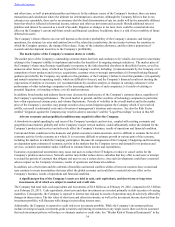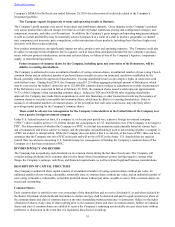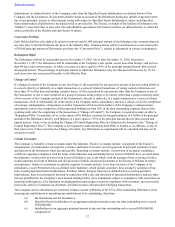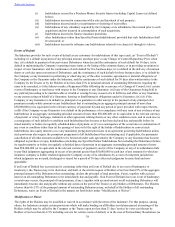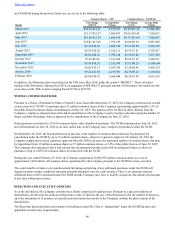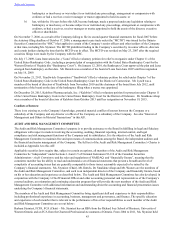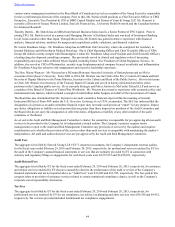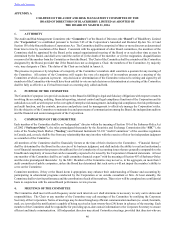Blackberry 2016 Annual Report Download - page 45
Download and view the complete annual report
Please find page 45 of the 2016 Blackberry annual report below. You can navigate through the pages in the report by either clicking on the pages listed below, or by using the keyword search tool below to find specific information within the annual report.
Table of Contents
36
Class A Common Shares
The holders of class A common shares are not entitled to receive notice of, or attend or vote at, any meeting of the Company’s
shareholders, except as provided by applicable law. Each such holder is entitled to receive notice of, and to attend, any
meetings of shareholders called for the purpose of authorizing the dissolution or the sale, lease or exchange of all or
substantially all of the Company’s property other than in the ordinary course of business and, at any such meeting, shall be
entitled to one vote in respect of each class A common share on any resolution to approve such dissolution, sale, lease or
exchange. Dividends are to be declared and paid in equal amounts per share on all the common shares and the class A common
shares without preference or distinction. Subject to the rights of holders of any class of share ranking prior to the common
shares and class A common shares, in the event that the Company is liquidated, dissolved or wound-up, holders of common
shares and class A common shares are entitled to receive the remaining assets ratably on a per share basis without preference or
distinction.
The Company authorized for issuance the class A common shares when the Company was a private company to permit
employees to participate in equity ownership. Class A common shares previously issued by the Company to such employees
were converted on a one-for-one basis into common shares in December 1996. At this time, the Company has no plans to issue
further class A common shares.
Preferred Shares
The holders of preferred shares are not entitled to receive notice of, or to attend or vote at, any meeting of the Company’s
shareholders, except as provided by applicable law. Preferred shares may be issued in one or more series and, with respect to
the payment of dividends and the distribution of assets in the event that the Company is liquidated, dissolved or wound-up,
rank prior to the common shares and the class A common shares. The Board has the authority to issue series of preferred shares
and determine the price, number, designation, rights, privileges, restrictions and conditions, including dividend rights, of each
series without any further vote or action by shareholders. The holders of preferred shares do not have pre-emptive rights to
subscribe to any issue of the Company’s securities. At this time there are no preferred shares outstanding and the Company has
no plans to issue any preferred shares.
Convertible Debentures
The following is a summary of the material attributes and characteristics of the Debentures. This summary does not purport to
be complete and is subject to, and qualified in its entirety by, the terms of the Indenture (as defined below). Reference is made
to the Indenture, which has been filed on SEDAR at www.sedar.com and with the SEC at www.sec.gov, for complete
descriptions of the Debentures.
General
The Debentures are direct, unsecured debt obligations of the Company and are issued under an indenture (the “Trust
Indenture”) dated as of November 13, 2013 between the Company, as issuer, BlackBerry Corporation, BlackBerry UK Limited,
BlackBerry Finance, LLC and BlackBerry Singapore Pte. Limited, as guarantors (collectively, the “Guarantors”) and
Computershare Trust Company of Canada, as trustee (the “Trustee”), as supplemented by a supplemental indenture dated as of
December 12, 2013 between the same parties (the “First Supplemental Indenture”) and a second supplemental indenture dated
as of April 30, 2014 between the same parties (the “Second Supplemental Indenture”, and together with the First Supplemental
Indenture and the Trust Indenture, the “Indenture”). The Debentures are limited in the aggregate principal amount of
$1,250,000,000.
The Debentures have a maturity date of November 13, 2020 (the “Maturity Date”), subject to the prior conversion, redemption
or payment thereof as provided by the Indenture.
Each of the Guarantors has separately guaranteed the payment of principal, premium (if any) and interest and other amounts
due under the Debentures, and the performance of all other obligations of the Company under the Indenture (the “Guarantees”).
Other significant subsidiaries of the Company may be required to provide such Guarantees where they satisfy certain financial
tests.
Interest
The Debentures bear interest at a rate of 6% per annum, payable in equal quarterly instalments in arrears on the last day of
February, May, August and November of each year. If an Event of Default (as defined below) has occurred and is continuing,
the Debentures will bear interest at a rate of 10% per annum during the period of the default.
Subordination
The Debentures rank pari passu with one another, in accordance with their tenor without discrimination, preference or priority
and, subject to statutory preferred exceptions, shall rank equally with all other present and future unsubordinated unsecured


